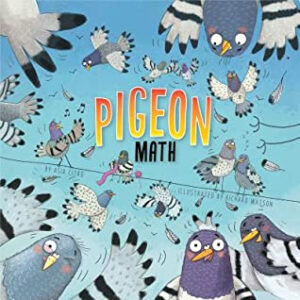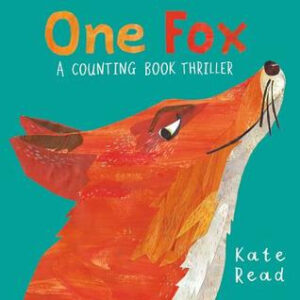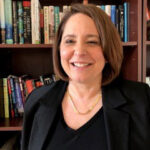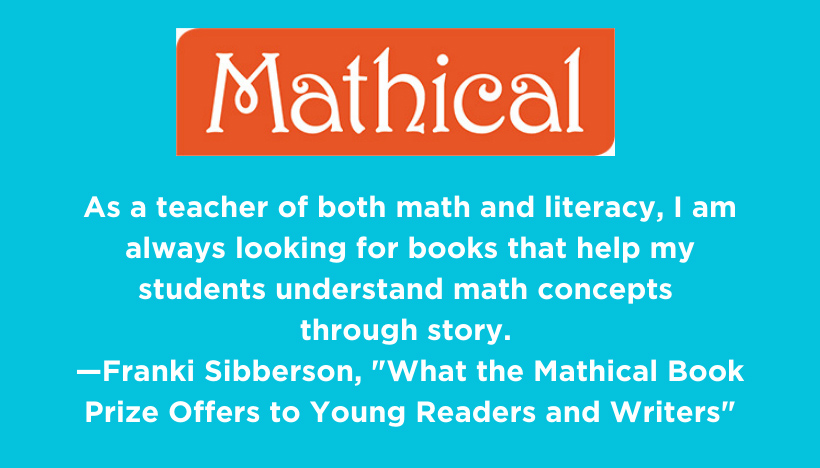This post was written by NCTE Past President Franki Sibberson.
I love discovering new book awards. After serving on the committee for the NCTE Charlotte Huck Award® for Outstanding Fiction for Children, I realized firsthand the care with which award books are selected. As I read about other book awards, I realized that each award committee is celebrating books that match a vision they have for our children.
The Mathical Book Prize is a children’s book award that I’ve recently discovered. The Mathical Book Prize website introduces the award program this way: “Math is more than numbers and equations! The Mathical Book Prize is an annual award for fiction and nonfiction books that inspire children of all ages to see math in the world around them.”
I have been an elementary teacher for over 30 years, and most of those years were in self-contained classrooms. So as a teacher of both math and literacy, I am always looking for books that help my students understand math concepts through story.
This year, I was excited to see the 2020 Mathical picture book winners. I knew they would be an important addition to early childhood and elementary classrooms. I loved Pigeon Math by Asia Citro when I first read it. I knew immediately that not only would children enjoy this book, but it would make math come alive for them in a way that was really fun. The math is such a natural part of the story and it is engaging from the first page. It is a perfect book to help young mathematicians see math in the real world in order to build understanding.
While the math elements are prominent, I realized when I reread the book how much it has to offer to young readers and writers as well. I sometimes forget about the ways these math stories can serve as mentor texts for our youngest writers.
 As a teacher of reading and writing, I find powerful the many invitations Pigeon Math has for readers and writers of all ages to participate on their own. I read the book to a group of third graders and a few immediately wanted to try to write their own humorous math story. From the engaging plot to the detailed adjectives to the changing size and font of the text, there are so many ways for student readers and writers to learn from this book.
As a teacher of reading and writing, I find powerful the many invitations Pigeon Math has for readers and writers of all ages to participate on their own. I read the book to a group of third graders and a few immediately wanted to try to write their own humorous math story. From the engaging plot to the detailed adjectives to the changing size and font of the text, there are so many ways for student readers and writers to learn from this book.
 The other Mathical Prize winning picture book this year was One Fox: A Counting Book Thriller by Kate Read. Again, this book will help young children make sense of math concepts. But it also provides a great mentor text for young readers and writers. I could see using this book to teach lessons on the ways that the words and pictures go together to tell a story, or the careful word choices the author made in creating this story. There is something very playful about trying to tell a story in counting book format, and this book may very well invite writers to play with writing their own clever counting book.
The other Mathical Prize winning picture book this year was One Fox: A Counting Book Thriller by Kate Read. Again, this book will help young children make sense of math concepts. But it also provides a great mentor text for young readers and writers. I could see using this book to teach lessons on the ways that the words and pictures go together to tell a story, or the careful word choices the author made in creating this story. There is something very playful about trying to tell a story in counting book format, and this book may very well invite writers to play with writing their own clever counting book.
The Mathical Book Prize reminds us of the value of math books to build understanding. And as teachers of young readers and writers, we also have to remember that these books—the most recent winners as well as past winners—can serve as powerful mentors for both fiction and nonfiction readers and writers.

Franki Sibberson is a literacy consultant with over 30 years of classroom teaching experience. She is a widely published author and is Past President of NCTE.
It is the policy of NCTE in all publications, including the Literacy & NCTE blog, to provide a forum for the open discussion of ideas concerning the content and the teaching of English and the language arts. Publicity accorded to any particular point of view does not imply endorsement by the Executive Committee, the Board of Directors, the staff, or the membership at large, except in announcements of policy, where such endorsement is clearly specified.

